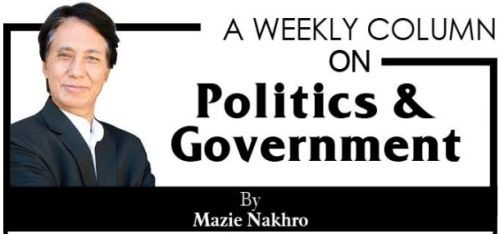
It’s true that Nagaland has an opposition-less government. But, sadly, that government doesn’t seem to meet the definition of a team. This is because it lacks any real core value or compelling vision around which all of its members can unite. Even within its own camp, each sub-group seems to be working against the other groups or each member essentially pursuing his own personal goal and in any direction he wants. Or sometimes their lack of concerted effort may be a result of team members simply not knowing the overall direction of the team and how they can contribute to its success.
What, then, makes a real team? For this, let’s turn to the “Goose Story.” It is said, for example, that when geese fly together, they fly along in a V-formation. As each bird flaps its wings, it creates an uplift for the bird immediately following, thereby adding at least 70% greater flying range than if each bird flew on its own. When a goose falls out of formation, it suddenly feels the drag and resistance of trying to do it alone, so it quickly returns to the formation to take advantage of the lifting power of the group. When the lead goose gets tired, he rotates back in the wing and another goose flies point. The geese at the back honk from behind to encourage those up front to keep up their speed. If a goose gets sick or is wounded and falls out, two geese fall out of formation and follow him down to help and protect him. And they stay with him until he is either able to fly or until he is dead, and then they launch out again on their own or with another formation.
Success is hardly a solo project. It’s all about synergy--- the concept of adding 1 plus 1 and getting 11, not just 2. You have to work with a team that shares the same dream or objective because people working together can accomplish far more than each one working separately. Simply put, teamwork makes success quicker and easier because they are traveling on the thrusts of one another.
At the core of the success of real dream team is a clear understanding in the minds of all team members of why the team exists. This understanding is accompanied by a deep commitment to the mission, which is derived from the general belief that “what we’re doing is important---it’s worth my life.”
Does this mean that you should pick only those people who are just like you to be on your team? No. Interestingly, the all-wise God made us all incomplete. Even at the most basic level, which is the family unit, each member is wired differently. That’s how it is in my family. My younger daughter is like an owl— she is good at prioritizing and planning for her next move. My older daughter is like a pet-dog— always ready to greet acquaintances with “a lick and a wagging tail,” as it were. That is, her strength is in socializing. My wife takes after a squirrel—she is detailed-oriented, predictable, consistent, and steady. In my case, my animal personality type is that of a lion---decisive, independent, and directing. As for some of my weaknesses, I tend to be more impatient with work speed and less sensitive to others’ feelings.
Ironically, a dream team is usually made up of people with different personality types and work styles. For sure, people like me need a lot of “squirrels” to slow us down to a reasonable speed, to bring stability to the team, and to work on a step-by-step work sequence. We need a few “owls” to help us think logically, analyze problems, and develop processes or systems. Furthermore, we need some “pet dogs” to help us enjoy working with people and to bring excitement in our workplaces.
Clearly, a wide range of diverse personality types and work skills are required for team success. This understanding can lead us to an “all for one, one for all” type of thinking (win-win cooperation) and create the magic or synergy of everyone working together. On top of this, when roles are clearly defined and aligned, the idea that “none of us is as good as all of us” becomes operational.
Indeed, there shouldn’t be any “boring work” in a team. The problem is in assigning the wrong work to the wrong person. That’s why we need to swap duties whenever there is work inefficiency or low morale among the team members. Ideally, everyone should have some freedom to delegate the work he or she doesn’t do well. What someone considers “boring work” can be someone else’s favorite thing to do. This can triple what gets done, because what we hate to do bores us, and what bores us slows us down. Doing work with this mutual understandings will allow everyone to work more efficiently and, in the long run, achieve far better results.



